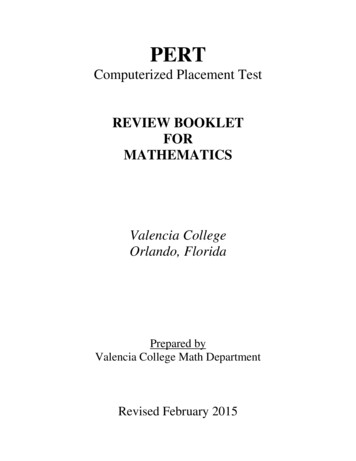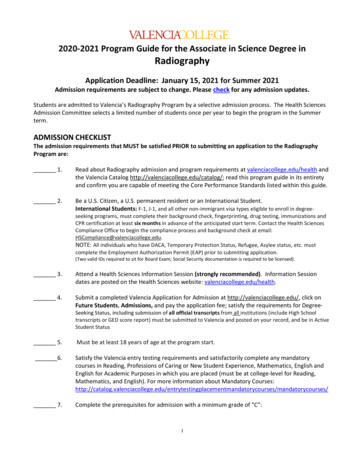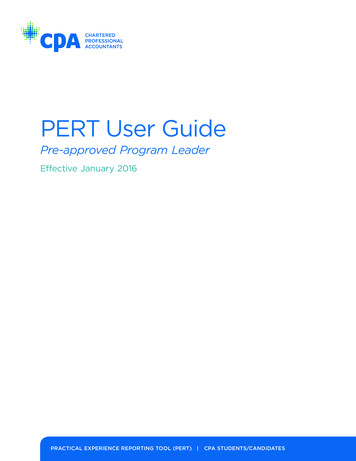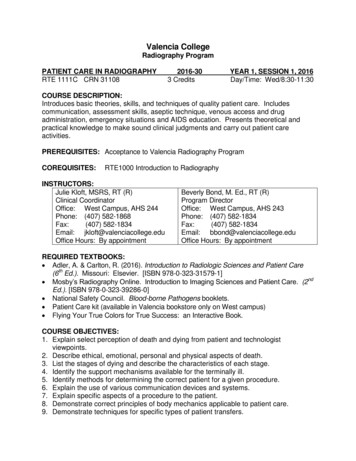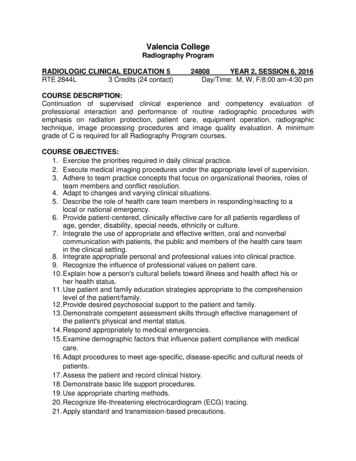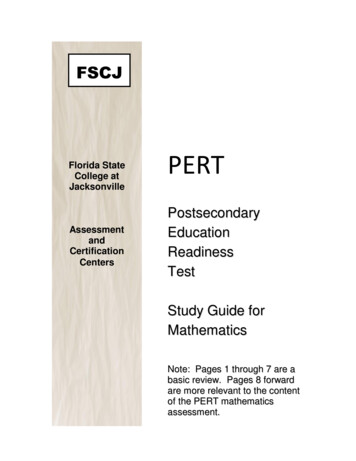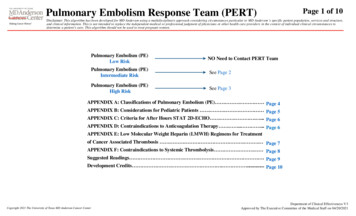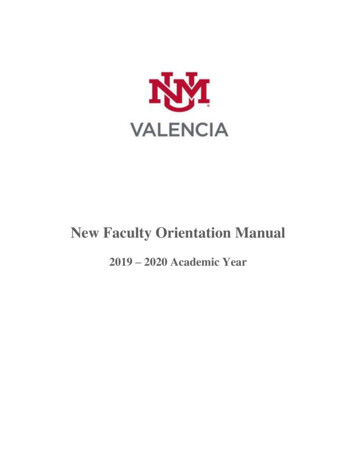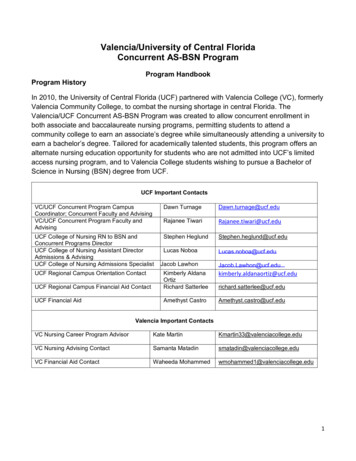
Transcription
PERT Review GuideWriting and Sentence Skills
About this ResourceWho it’s forThis guide is for students preparing to take the PERT assessment,students preparing to retake the PERT, or for students who would like tobrush up on their sentence and writing skills.What it isThe information in this book is meant to provide a review of major sentenceand grammar skills needed to pass the PERT Writing Assessment as well asthose skills needed to be a strong college-level writer.It is not a comprehensive course in academic or college-level writing. If youhave no previous experience with the subject matter, it is unlikely that thisguide will provide enough information for you to be adequately prepared. If thatis the case, it may be more beneficial to take a developmental writing course,instead.In this Guide:General PERT InformationSentence Skill Tips & PracticeReview Questions with KeyArea for Notes or Questions
Materials composed, compiled, edited and formatted by ValenciaCollege Learning Support staff and English faculty at Osceola CampusRevised 2016
Table of ContentsParallelism .1Verb Tense .3Eliminating Wordiness .9Subject/verb Agreement .13Coordination .17 Comma splices Semicolons Fused/run-on sentencesSubordination .23 FragmentsDangling/misplaced Modifiers .27Clear Pronoun Reference .31Logical Comparisons .35Review Questions .39Answer Key .45Notes(for potential review session) .46Appendix .49Resources: -the-exam.cfm
Things to consider about thePERT.The PERT assessment is meant to determine whether you are ready forcollege level classes. Ultimately, your score on the test will place you intoeither college-prep or college-level courses. Consequently, the more seriouslyyou take the test, the more likely you are to prepare appropriately.Although students want to start college-level classes immediately, it is oftenmore advisable to take those classes that are accurately leveled to thestudent. Some students decide to take courses for which they are notprepared, and they often end up struggling through the semester, feeling lostand discouraged, withdrawing from the course, or maybe even failing.In the end, it would be better to take the proper developmental or prep classand be well-prepared for the college-level class rather than to fail and retakeit. Even though taking a prep course would require an extra cost upfront, itcould more than pay for itself down the road in time, emotional health, andeven further tuition costs.It will not help in the long run to crash study new material right before thePERT so that you can test into a higher-level class. Short-term minimalknowledge of what will ultimately be the primary discourse for the class mayleave you feeling lost and struggling to keep up with the material.It is easy to focus on the PERT as a “pass or fail” test, but it is important toremember that the test is not designed to measure your intelligence. It is anassessment of your academic competencies and whether they are refinedenough to help you succeed in a college environment.
Skill Areas
Writing Skill 1 - ParallelismParallelismOverviewYou should use parallelism whenever you have two or more items in a list or series.Parallelism is when you use the same grammatical structure (all adjectives, allnouns, all verbs, etc.) for each item in your list or series. First, ask what is being listed.Second, ask what grammatical structure is set up.Finally, ask whether the structure for each item ‘matches’.If it doesn’t, the sentence lacks parallelism.Example 1 John wanted to be happy, popular, and have a lot of money. What is being listed?What John wants to be.What is the primary grammatical structure?AdjectivesDo all items listed “match”? No. The last is a verb phrase.Choose an adjective that describes someone who has “a lot of money”.John wanted to be happy, popular, and rich. Now, the sentence has parallel structure.Example 2 Maria needed to talk to her teacher, rent a bus, and was buyingsupplies. What is being listed? What Maria needed to doWhat is the primary grammatical structure? Present tense infinitive phrases.Do all items listed “match”? No. The last is a past progressive verb.Choose a present tense verb to replace “was buying”Maria needed to talk to her teacher, rent a bus, and buy supplies. Now, the sentence has parallel structure.Page 1
Writing Skill 1 - ParallelismExample 3 Joe looked under the bed, above the door, and searched in thecloset. What is being listed? The places Joe lookedWhat is the primary grammatical structure? Location and nounDo all items listed “match”? No. The third is a verb phrase.Choose a location and noun to replace “searched in the closet”Joe looked under the bed, above. the door, and in the closet. Now, the sentence has parallel structureQuick TestWhich part of the sentence is not parallel?1. Della A) found an old family recipe, B) purchased the special ingredients, and C)was planning to surprise her friends with a savory dish.2. A) Swimming, B) water skiing, and C) to play golf are activities that providegood exercise.3. A) Outstanding reference books, B) art exhibits that are rewarding and C)interesting videos are available for all students in the Valencia LearningResources Center.Answers1. C: was planning should be “planned”2. C: to play golf should be “playing golf”3. B: art exhibits that are rewarding should be “rewarding art exhibits”Page 2
Writing Skill 2 – Verb TenseVerb TenseOverviewDefined: Verb tense is the form of a verb used to indicate a point in time.Verbs tell time by changing their form. This is more commonly known as verb tense.Verb tenses help us understand exactly when actions occur. Some sentencesrequire a combination of tenses to make an idea clear. In such situations, if you donot use the correct combination of tenses, you send your readers on a bumpy journeythrough the past, present, and/or future. The proper (or improper) use of verb tense can make all the difference inplacing readers where you want them to be in time. Each verb tense serves a particular purpose in telling time along achronological series of events. It is important to know which tense to use for the correct point in time.1) Sam had never seen a more beautiful painting.(before that moment, but he has since)2) Sam has never seen a more beautiful painting.(since that moment, and still hasn’t yet)3) Sam will never see a more beautiful painting.(predicts that he won’t, ever again)Each choice carries a different meaning for the reader: Ask where, in time, the reader is led to be.What has already happened, what is happening, or what will have happenedat the very point you place the reader?Page 3
Writing Skill 2 – Verb TenseFor compound sentences, ask at what moment each event occurred or will occur,which will help you decide what the right verb form should be.1) Javier will play video games after leaving work.(he is still at work and plans to play after he has already left)2) Javier plays video games after leaving work.(he plays not just once, but as part of a present routine)3) Javier played video games after leaving work.(he played once, at one point in the past)4) Javier would play video games after leaving work.(he played not just once, but as part of a past routine, and doesn’t anymore)Also remember that had has two forms: past tense in time and past tense inpossession.It had rained (past tense in time)I had a date (past tense possession)Some rare cases require both forms to communicate something specific:I had had a date. (He once did, but the date was cancelled. He no longer hasthe date)I had a date (The date occurred and is now over)To decide verb tense within a sentence that describes more than one action, askwhen each action took place and at what point the reader should be. This will be asentence with a main clause and a subordinate clause.Your clues are words like: afterbeforeby the timeuntilifunlessTom was afraid of snakes until he saved one from a trap.These help place the action in the correct place on the timeline.Page 4
Writing Skill 2 – Verb TenseOften the difficult part is to decide which action to emphasize and which to putin the background. Your choice of verb tense will depend on your choice ofwhen each thing occurred and/or when each thing will (or might) occur.ExamplesMaurice never eats hamburgers because he respects cows.(two simultaneous actions)Maurice will have healthy arteries if he continues to avoid beef.(predicts the results of a continuing current action)Diane knows that her beagle chewed the big hole in the sofa.(present tense knowledge of a past tense event)Diane knew that her beagle had destroyed the sofa.(past tense knowledge of a past tense event)Diane will be even more upset because the dog also shredded a good shirt.(predicts the discovery of a past tense event)Juan plans to buy a new car because any day his Ford Pinto will be ready for thescrap yard.(present tense action as a result of an event predicted to happen in the future)Juan sold the old Ford he had had for so long.(past tense event that occurred before another, completed event)*notice the use of “had had” for both past tense in time and past tense possessionWhen to use had:Special cases seek to put one completed event further in the past thananother, more recent past tense event. Ask how many steps into the pastyour first clause has travelled. If there are no steps into the past, simplepast tense should be used in the second clause. If there is one step intothe past, you’ll need the word ‘had’ which creates the past perfect tense.ExamplesPage 5
Writing Skill 2 – Verb TenseThese first clauses take no steps into the past:Marie can’t remember who took the book from her desk. (present)Marie won’t remember who took the book from her desk. (future)Luke will take the book he asked to borrow. (future)These cases express present (or predicted) actions that occur (or will occur)after a past action.These first clauses take one step into the past:Marie couldn’t remember who had taken the book from her desk.Luke took the book he had asked to borrow.These cases express one past action that occurred after another past action.Quick TestIn the sentences that follow, choose the correct form of the verb.1. The spider will have eaten all the bugs by the time the night (was over, is over).2. Jason knew that he (lost, has lost, had lost) his wallet when he found his backpocket empty.3. Tenesha looks tired when she (works, worked) late.4. Jasmine will need an apology ready when she (steps, stepped, had stepped) onhis glasses.5. Omar was certain that he (buys, bought, had bought) mushrooms just the otherday.Page 6
Writing Skill 2 – Verb TenseAnswers1. is over (predicts the future result of a present situation)2. had lost (expresses a past tense discovery of a past tense event)3. works (expresses a present tense ongoing routine)4. steps (predicts two future events that will happen in a particular sequence)5. had bought (expresses past tense knowledge of a past tense event)Page 7
Page 8
Writing Skill 3 – Eliminating WordinessEliminating WordinessOverviewDefined: Wordiness is using more words than are necessary to convey a message.It’s often tempting to use a lot of words to fill up space or make yourself soundmore sophisticated. The truth is that extra words often have the opposite effect. Itis sometimes easier to think of more words to use than it is to take out the onesyou don’t need. Though you might think that more and fancier words make yourwriting interesting, they create a drag that leaves the reader tired and the meaninghard to find.Taking out wordy phrases from your writing makes it concise-clear and withoutunnecessary content. Three main causes of wordy writing are:1. long phrases2. redundant phrases3. utility words1. A long phrase is a group of words that carry the same meaning as a single wordor carry no real meaning at all. Some common long phrases are: To tell the truth,come to find out, for all intents and purposes, due to the fact, in this day andage More often, a single word is more effective than a long phrase.Wordydue to the fact thatat this point in timein this day and agein the event thatat frequent timesConcisebecausenowtodaywhen/ ifoftenPage 9
Writing Skill 3 - WordinessWordy:Concise:Due to the fact that Nora hadn’t seen the movie, she didn’t knowthe plot.Because Nora hadn’t seen the movie, she didn’t know the plot.Wordy:In the event that the restaurant closes down, the patrons won’t betoo happy.Concise:If the restaurant closes down, the patrons won’t
PERT so that you can test into a higher-level class. Short-term minimal knowledge of what will ultimately be the primary discourse for the class may leave you feeling lost and struggling to keep up with the material. It is easy to focus on the PERT as a “pass or fail” test, but it is important to remember that the test is not designed to measure your intelligence. It is an assessment of .
